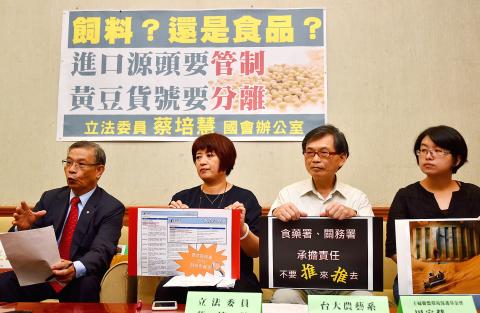While nearly 80 percent of soybeans used for food are genetically modified, the Customs Administration should strictly classify imported soybeans into different grades for different uses, Democratic Progressive Party Legislator Frida Tsai (蔡培慧) said yesterday.
A total of 2.685 million tonnes of soybeans were imported last year, but only 59,000 tonnes were non-genetically modified soybeans, she said, adding that soybeans are a common food ingredient.
According to a US agricultural report, Taiwanese consume approximately 280,000 tonnes of soybeans as food per year, which is much higher than the amount of non-genetically modified imported soybeans.

Photo: Chien Jung-fong, Taipei Times
“Soybeans should be classified and controlled when they are being imported,” Tsai said, adding that the Customs Administration should differentiate between “food-grade” and “feed-grade” soybeans, as well as “genetically modified” and “non-genetically modified” soybeans, to ensure food safety.
She suggested the agency use specialized commodity codes for the different types of soybeans.
Tsai also urged the Food and Drug Administration (FDA) to regulate that soybeans for food use must be non-genetically modified food-grade soybeans.
Genetically modified food-grade soybeans should only be used for making cooking oil, while feed-grade soybeans should not be made into any type of food, Tsai said.
A report made by Homemakers United Foundation earlier this year cited a Japanese study by the US Soybean Export Council, in which it said Japan imports about 3 million tonnes of soybeans per year, with 66 percent used for making cooking oil, 4 percent for animal feed and 30 percent for food use — such as making tofu, miso, natto and soy sauce.
Most of the direct food-use soybeans were non-genetically modified, it said.
Customs Administration Deputy Director-General Hsieh Ling-yuan (謝鈴媛) said imported soybeans are classified into non-genetically modified and genetically modified soybeans, and that differentiating between food-grade and feed-grade soybeans is technically possible, but it would require extra funding because custom officers are not able to tell them apart by sight.
FDA official Chen Hsin-cheng (陳信誠) said that it is possible to use different codes for the different types of imported soybeans and the agency would discuss the issue with the Council of Agriculture.

A Taiwanese software developer has created a generative artificial intelligence (AI) model to help people use AI without exposing sensitive data, project head Huang Chung-hsiao (黃崇校) said yesterday. Huang, a 55-year-old coder leading a US-based team, said that concerns over data privacy and security in popular generative AIs such as ChatGPT and DeepSeek motivated him to develop a personal AI assistant named “Mei.” One of the biggest security flaws with cloud-based algorithms is that users are required to hand over personal information to access the service, giving developers the opportunity to mine user data, he said. For this reason, many government agencies and

The National Fire Agency on Thursday said a series of drills simulating a magnitude 8.5 earthquake would be held in September to enhance the government’s emergency response capabilities. Since earthquakes cannot be predicted, only by continuously promoting disaster prevention measures could Taiwan enhance its resilience to earthquakes, agency Director-General Hsiao Huan-chang (蕭煥章) said in a news release. The exercises would be held to mark annual National Disaster Prevention Day on Sept. 21, the aim of which is to test Taiwan’s preparedness and improve its earthquake resilience in case of a major temblor, Hsiao said. As part of those drills, an earthquake alert would

DEFENSE: The National Security Bureau promised to expand communication and intelligence cooperation with global partners and enhance its strategic analytical skills China has not only increased military exercises and “gray zone” tactics against Taiwan this year, but also continues to recruit military personnel for espionage, the National Security Bureau (NSB) said yesterday in a report to the Legislative Yuan. The bureau submitted the report ahead of NSB Director-General Tsai Ming-yen’s (蔡明彥) appearance before the Foreign and National Defense Committee today. Last year, the Chinese People’s Liberation Army (PLA) conducted “Joint Sword-2024A and B” military exercises targeting Taiwan and carried out 40 combat readiness patrols, the bureau said. In addition, Chinese military aircraft entered Taiwan’s airspace 3,070 times last year, up about

STRICTER ENFORCEMENT: Taipei authorities warned against drunk cycling after a sharp rise in riding under the influence, urging greater public awareness of its illegality Taipei authorities have issued a public warning urging people not to ride bicycles after consuming alcohol, following a sharp rise in riding under the influence (DUI) cases involving bicycles. Five hundred and seven people were charged with DUI last year while riding YouBikes, personal bicycles, or other self-propelled two-wheelers — a fourfold increase from the previous year, data released by the Taipei Police Department’s Traffic Division showed. Of these, 33 cases were considered severe enough to be prosecuted under “offenses against public safety,” the data showed. Under the Road Traffic Management and Penalty Act (道路交通管理處罰條例), bicycles — including YouBikes and other